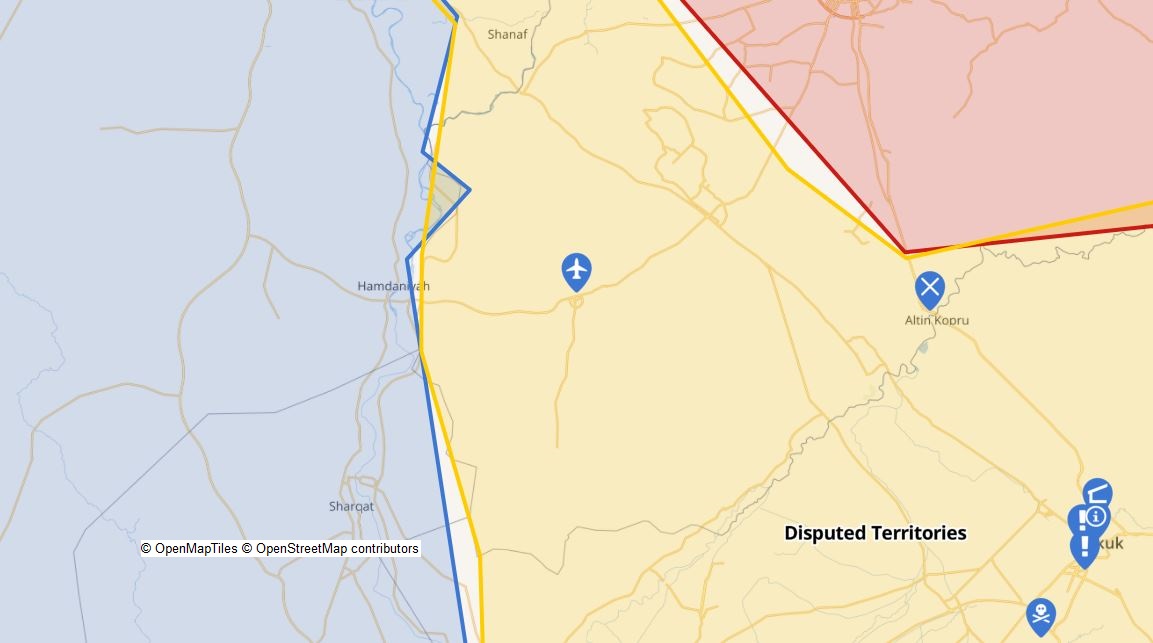1.3K
Kirkuk
- The Iraqi army built three new military bases in the Kurdish neighborhoods of Rahimawa, Panjaali, and Ronaki. They also set up eleven checkpoints inside the Kurdish areas under the pretext of ISIS (Da’esh) threats on the airport and the central prison. However, the airport remains unopened, and according to sources, most Da’esh prisoners have been transferred to Baghdad prisons. Local Kurds expressed dissatisfaction with the Iraqi army’s plans inside residential areas, which is considered part of the pressure on the Kurdish population.
- For the first time, despite his and the party’s anti-Kurdish rhetoric, the Turkish-backed Turkman Front lawmaker Arshad al Salahi released a video describing the situation in Kirkuk as “on the verge of collapsing.” Salahi said the Kirkuk is “full of strangers” from other provinces, taking the province’s sources, and crimes, drug dealings, and terrorism has increased. Salihi’s remarks are interpreted as praise for the Kurdish-led administration before 2017.
- Last week, the Iraqi interior ministry issued a high alert for Kirkuk’s police. In the days following the alert, checkpoints were set up in the city by the local police. On Monday, February 14th, ISIS (Da’esh) attacked the federal police near Daquq district, wounding one officer. The following day, the 11th brigade of federal police announced the discovery of a Da’esh hideout containing ammunition and bombs near al Aresha village in Hawija district. Security forces also claimed to haveoiled an attack on two power towers in Hawija, and arrested three terrorists, including two in Pirde and Laylan main checkpoints. Da’esh remains a security threat due to the vacuum left by the Kurdish Peshmerga forces when Baghdad and Iranian-backed militias removed them on October 16th, 2017.
- On Saturday, February 12th, unknown perpetrators painted over the Kakie Kurdish memorial wall, designated for those martyred by terror groups since 2003. So far, no investigation has been launched by authorities. Further, the acting governor of Kirkuk, Rakan al Jabouri, removed two more Kurds from senior posts in the governorate and appointed Arabs from his tribe instead. The removal of Kurdish-led posts, heads of accountancy, and engineering are the most recent out of dozens of changes since October 16th, 2017.
- In a conference addressing Kirkuk’s development, the deputy director of the investment board, Jarallah Abdullah, said that 90% of granted investment permits have failed. Abdullah blamed Baghdad’s bureaucracy imposed on investors and that most of the land being owned by the federal government.
Khanaqin
- A Da’esh IED on Khanaqin-Qaratapah road wounded four Iraqi army soldiers on Tuesday. Separately, brought up Arabs attacked Kurdish-owned lands and attempted to occupy them in Jalawla. The Iraqi ministry of agriculture recently renewed contracts of Arab farmers on Kurdish-owned lands, a policy the former regime practiced. The issue remained unsolved in Jalawla.
Tuz Khurmatu
- On Thursday, February 17th, a Da’esh IED killed a shepherd and wounded another near the Zanana area. Moreover, several villagers around Tuz Khurmatu protested the electricity shortage, including in Lak, Qoshalan, and Qom Palak. The area receives three to five hours of electricity per day.
Makhmour
- US war jets struck Da’esh hideouts near the Qara Chokh mountain. No details have been released, but the area has become Da’esh headquarters since October of 2017.
- Refugees in the Makhmour Camp protested the continued Turkish airstrikes, killing several civilians since 2017. Camp residents, Kurds from Turkey, called upon the United Nations (UN) to impose a no-fly zone on Nineveh province, where Turkey constantly targets Yazidis and the refugee camp.
Shingal (Sinjar)
- According to a report by al-monitor, the Turkish airstrikes have killed 80 Yazidis since 2017, preventing displaced ones from returning. Thousands of Yazidis remain displaced in camps in the Kurdistan Region, amid a lack of security and essential services in their home, Shingal.
- An Iraqi general named Atheer al Robaie threatened to “bury” Yazidis if they took down the Iraqi flag and hung Abdullah Ocalan’s posters in the town. The video went viral on social media amid rejection of al Rubaie’s remarks. Tensions have been high between some of the Yazidi Kurds, part of the Sinjar Resistance Units (YBS), and the Iraqi security forces.

